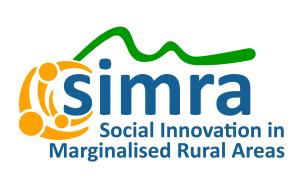SIMRA – a European Cooperative Research project funded by the H2020 EU Framework Programme is making its first advances in identifying key success criteria and good practice examples for social innovation in some of the most marginalised rural areas in Europe and the Mediterranean.
 The project was born with the aim of decoding and explaining what makes a good idea or project successful in often under populated, isolated or challenged geographical areas. It aims to drive innovative solutions through reconfiguring social practices and implementing proven and successful civil society actions. The SIMRA project is set to run from April 2016 to March 2020 and involves 26 organisations across Europe and the Mediterranean. The project aims to understand the mechanics behind the success of trialled and tested examples of innovation that improve people’s lives, add value to the local economy, enhance the circular economy (i.e. placing sustainable production and farming techniques at the core of all actions) and encourage people to reinforce their “roots” in marginalised areas.
The project was born with the aim of decoding and explaining what makes a good idea or project successful in often under populated, isolated or challenged geographical areas. It aims to drive innovative solutions through reconfiguring social practices and implementing proven and successful civil society actions. The SIMRA project is set to run from April 2016 to March 2020 and involves 26 organisations across Europe and the Mediterranean. The project aims to understand the mechanics behind the success of trialled and tested examples of innovation that improve people’s lives, add value to the local economy, enhance the circular economy (i.e. placing sustainable production and farming techniques at the core of all actions) and encourage people to reinforce their “roots” in marginalised areas.
Over 40 innovative examples coming from areas such as agriculture, forestry, fisheries, energy and rural development have so far been identified and include examples such as:
- A box of sea from Greece – which delivers fresh sustainably caught fish straight to the table of Greek consumers while ensuring a fair price to local fishermen.
- An Austrian bio-dynamic farm – providing sustainably grown food for 30 “harvest-sharers” or consumers.
- A community led voluntary fire-fighting team from a Catalan village which has reduced the incidences of local fires and turned the dead-wood collections into a viable energy source for schools and other buildings.
- “Adopt a terrace in the Italian Alps” where over 100 abandoned terrace farms are now again being cultivated or receiving donations to help restore dilapidated mountain slopes, improving safety and adding value to the local economy and environment.
Other examples include a cooperative offering day-care for children on farms for women farmers; a project in Eastern Europe promoting organic agriculture for disadvantaged Roma and non-Roma people with an accompanying educational programme; community led local and traditional food growing projects; community owned wind turbines and energy generation projects often involving local crowd funding techniques; energy smart storage projects for rural communities dependent on intermittent supplies.
The SIMRA project has analysed hundreds of examples and assessed each one on the following criteria:
- evidence of reconfiguration of social practices in response to societal challenges
- the active involvement of civil society or grassroots organisations
- the novelty or reconfiguration taking place in new geographical settings or in relation to previously disengaged social groups
- improves societal wellbeing through social, environmental or economic aims
The project not only counts on the active participation of its member organisations but has developed a built-in consultation platform to ensure that stakeholder and community led organisations can shape SIMRA´s outcomes to meet the needs of local communities.
The results of the project will be shared throughout the life of the project and will be targeted at policy-makers, local development organisations, communities and individuals working at the community and rural level across Europe and the Mediterranean. As rural areas struggle with declining and ageing populations and increasing agricultural and environmental challenges, social innovation will contribute to reinvigorating local rural communities and help them to manage precious natural resources in productive agricultural settings.
Further information: SIMRA site, Brochure and database .
For further information:
Marie Clotteau, Director of Euromontana
Place du Champ de Mars, 2
1050 Bruxelles
+32 (0)2-280-42-83
marie.clotteau@euromontana.org
You can dowload and share the press release here
30 November 2017










